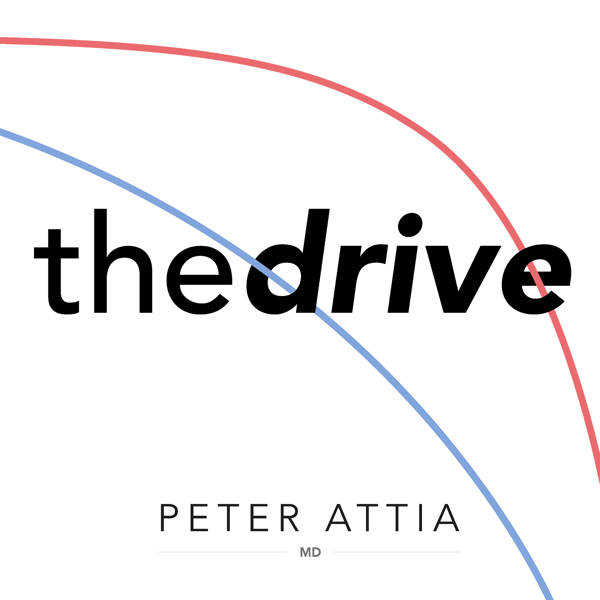#22 - Tom Dayspring, M.D., FACP, FNLA – Part III of V: HDL, reverse cholesterol transport, CETP inhibitors, and apolipoproteins
The Peter Attia Drive
Peter Attia, MD
4.7 • 7.3K Ratings
🗓️ 17 October 2018
⏱️ 64 minutes
🧾️ Download transcript
Summary
In this five-part series, Thomas Dayspring, M.D., FACP, FNLA, a world-renowned expert in lipidology, and one of Peter's most important clinical mentors, shares his wealth of knowledge on the subject of lipids. In Part III, Peter and Tom dig into HDL, why "reverse cholesterol transport" is a lot more nuanced than what most of us are taught, lipid transport, apolipoproteins, and more. In addition, this episode highlights the complexity of HDL and a discussion about the CETP inhibitor trials.
We discuss:
- Reverse cholesterol transport [1:40];
- Lipid transportation, apolipoproteins, VLDL, IDL, and LDL particles [11:00];
- Remnant lipoproteins and apoC-III [16:45];
- Particles having sex: lipid exchange [28:00];
- Cholesteryl Ester Transfer Protein (CETP) and CETP inhibitors [40:45];
- 2006 CETP inhibitor trial: torcetrapib (Pfizer) [54:45];
- 2012 CETP inhibitor trial: dalcetrapib (Hoffmann–La Roche) [56:15];
- 2017 CETP inhibitor trials: evacetrapib (Eli Lilly) and anacetrapib (Merck) [58:00]; and
- More.
Learn more at www.PeterAttiaMD.com
Transcript
Click on a timestamp to play from that location
| 0:00.0 | Hey everyone, welcome to the Peter Atia Drive. I'm your host, Peter Atia. |
| 0:10.0 | The drive is a result of my hunger for optimizing performance, health, longevity, critical thinking, |
| 0:15.7 | along with a few other obsessions along the way. I've spent the last several years working |
| 0:19.6 | with some of the most successful top performing individuals in the world, and this podcast |
| 0:23.8 | is my attempt to synthesize what I've learned along the way to help you live a higher quality |
| 0:28.3 | and more fulfilling life. If you enjoy this podcast, you can find more information on today's |
| 0:32.5 | episode and other topics at peteratiamd.com. |
| 0:41.7 | Welcome everybody to episode three of the week of day spring. In this episode, we talk about reverse |
| 0:48.2 | cholesterol transport, we talk about lipid transportation, we talk about apelipoproteins, |
| 0:54.5 | and we talk about C-TEP inhibitors and HDL. Of all the things we talk about here, the thing that |
| 1:00.7 | I think is the most interesting is the discussion on HDL, which I think most people today would agree |
| 1:07.8 | is far from being understood and is probably far more complicated than LDL biology. I would say |
| 1:15.2 | that of all of the things that Tom and I discussed over this seven hours, I learned the most |
| 1:20.3 | personally in our HDL discussion and our discussion of the C-TEP inhibitors. I was very familiar |
| 1:26.2 | with all of the trials here, but Tom brought a level of nuance to this that actually sharpened my |
| 1:32.9 | understanding of this, and for that I am, of course, eternally grateful. So welcome to episode three. |
| 1:41.4 | Let's define now direct versus indirect RCT. All right, so if we're talking about the |
| 1:47.3 | cholesterol, it's in lipoproteins. So at the end of the day, you have perfect cholesterol |
| 1:52.6 | homestasis, and for some reason there's some cholesterol excess in your body, it's going to wind |
| 1:59.7 | up in your artery wall, or if you're lucky, it's going to wind up in your stool. That would be |
| 2:05.1 | the preference way. So the body clearly had nose. Beyond the certain point, we don't want cholesterol, |
| 2:11.6 | we've talked about that a little bit a little and so far. So now how can the body get rid of |
... |
Please login to see the full transcript.
Disclaimer: The podcast and artwork embedded on this page are from Peter Attia, MD, and are the property of its owner and not affiliated with or endorsed by Tapesearch.
Generated transcripts are the property of Peter Attia, MD and are distributed freely under the Fair Use doctrine. Transcripts generated by Tapesearch are not guaranteed to be accurate.
Copyright © Tapesearch 2025.

